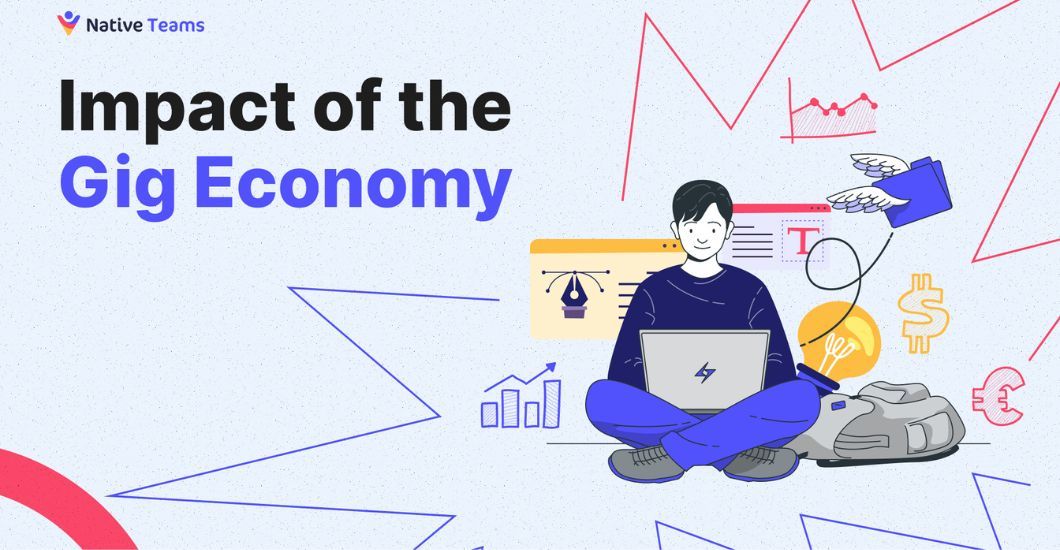Impact of the Gig Economy
The accelerated digitalisation has ushered significant changes in the traditional workforce. Email and other forms of online communication have allowed workers to collaborate regardless of their location.
The traditional workday based on schedules is slowly losing its appeal. Thanks to the rise of technology and the gig economy, people are embracing a more flexible structure of work by taking on short-term projects as needed.
So, what is the impact of the gig economy, and how will it shape the future of work? Keep on reading to find out!

How does the gig economy fit into the future of work?
Gig workers who take on short-term tasks or “gigs” usually get their pay compensation after each completed task. Nowadays, freelancers don’t need to spend a great deal of time building a professional image before receiving their first pay. Gig economy platforms aid in entering different sectors of the economy by being transparent and having assessment tools.
Several companies prefer temporary contracts with freelancers with a unique set of skills to meet the changing market demands. However, the traditional career path can be more challenging for freelancers as their achievements aren’t recognised on some platforms. The positive side of the coin is that their skills will always be up to date.
For employers, this means access to a large pool of talent to refine their business operations. Along with the communication tools available, it has never been easier to get in touch with potential clients, workers, and customers around the globe.
Why is the gig economy growing?
The gig economy started to flourish back in 2008 as a result of the Global Financial Crisis and its recession. The boom of the knowledge economy and dot.com companies have increased the popularity of freelancing and contract work.
Some traditional businesses experienced a collapse, while others changed the nature of their work structure. The manufacturing sector slowed down, and knowledge careers became prominent. Plus, people needed multiple streams of income to cover the rising costs.
Consequently, a rising trend of opening small businesses and entrepreneurship occurred. Many of these small businesses use the freelancers’ expertise to scale their brand visibility. Thus, the gig economy is constantly on a growth trajectory.
Impact of the gig economy on society
The gig economy has reshaped certain aspects of society, like the consumer-facing nature. Because of that, many platforms are changing consumption patterns. For example, Uber has increased the number of private-hire drivers, making transport practices more accessible across cities.
This allows consumers to externalise parts of their lives, such as passenger journeys, delivery of food, and on-demand services to the market and venture capital.
In addition, the Internet infrastructure and the numerous servers have an increasingly negative impact on the environment. The vast network of servers consumes an estimated three per cent of the global supply of electricity and produces two per cent of global greenhouse gas emissions.

Impact of the gig economy on businesses
The gig economy is built upon innovative solutions and has proven to be a lucrative model for many businesses. The gig model offers a myriad of benefits to businesses — from accessing a large talent pool to reduced overheads to survive any recession.
Here are some of the ways the gig economy is impacting businesses.
- Provides access to a large talent pool. The rise of the gig economy allows businesses to fill out open positions with skilled freelancers swiftly. The diverse skill set and demographics of gig workers can facilitate more business ideas and innovations.
- Reduces overhead expenses. Hiring freelancers usually costs less than onboarding a full-time employee, as businesses don’t cover any benefits. Having a mobile workforce can also help businesses to work through recessions without experiencing significant losses.
- Improves flexibility. Businesses can easily scale their workforce up and down depending on target objectives. In need of a marketing team, a business can quickly assemble the best marketing gig workers on the market for a short-term period. This allows businesses to utilise the available resources efficiently.
- Increases brand awareness. Employing temporary workers in locations where businesses want to expand can boost brand visibility. With only minimal operational costs and effective brand outreach in the new locations, businesses can proliferate their revenue.
Impact of the gig economy on HR
The rise of the global economy trend for HR personnel means shifting the focus on creating a coherent workspace between regular employees and gig workers. It also poses the need for a new employment model to ensure a smooth integration process.
This section will shed light on other gig economy implications for HR.
- Redefining roles. The gig economy is here to stay; therefore, HR management needs to reconsider the course of work. Freelancers aren’t the right fit for the whole job of a retail sales associate, but dividing work into several chunks can incur opportunities for gig workers.
- Evaluating gig worker impact. Platforms that track gig workers’ impact are just appearing on the scene. To define the impact of these gig workers on the workflow, it’s essential to compare the data to other workforce systems, so any issues and trends can be spotted.
- Updating traditional labour policies. As companies don’t cover gig workers’ benefits, HR will need to take charge of introducing new policies that provide proper rights and protection for these workers.
The workers’ experience in the gig economy
According to research, more than ¾ of gig workers root their satisfaction in the flexibility of scheduling and the supplement source of income. Another appealing aspect is the low barrier of entry to these non-standard forms of work for workers that struggle to enter the traditional labour market.
However, the lack of consistent, predictable income has resulted in high levels of anxiety among gig workers.
Unlike regular employees, gig workers also lack access to benefits like health insurance and retirement plans. Concerns about these gig economy benefits are most distressing for workers who depend on their gigs as a primary income.
What are the future directions of the gig economy?
The future of the gig economy will revolutionise the way that conventional organisations operate. Gig workers will play substantial roles that are hard to categorise in various companies around the world.
As the gig economy continues to thrive and the future of work rapidly modifies, companies will need to adapt to new tools and technologies to reap fruitful benefits. HR departments need to go beyond their traditional roles and become dexterous at managing global teams.

Wrapping up
The gig economy has facilitated the growth of many business sectors and changed the nature of work. Businesses need to embrace these changes if they want to stay on top of the ever-changing market demands and reduce costs.
